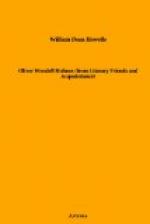He said a thousand witty and brilliant things that day, but his pleasure in this gave me the most pleasure, and I recall the passage distinctly out of the dimness that covers the rest. He chose to figure us younger men, in touching upon the literary circumstance of the past and present, as representative of modern feeling and thinking, and himself as no longer contemporary. We knew he did this to be contradicted, and we protested, affectionately, fervently, with all our hearts and minds; and indeed there were none of his generation who had lived more widely into ours. He was not a prophet like Emerson, nor ever a voice crying in the wilderness like Whittier or Lowell. His note was heard rather amid the sweet security of streets, but it was always for a finer and gentler civility. He imagined no new rule of life, and no philosophy or theory of life will be known by his name. He was not constructive; he was essentially observant, and in this he showed the scientific nature. He made his reader known to himself, first in the little, and then in the larger things. From first to last he was a censor, but a most winning and delightful censor, who could make us feel that our faults were other people’s, and who was not wont
“To bait his homilies with his brother worms.”
At one period he sat in the seat of the scorner, as far as Reform was concerned, or perhaps reformers, who are so often tedious and ridiculous; but he seemed to get a new heart with the new mind which came to him when he began to write the Autocrat papers, and the light mocker of former days became the serious and compassionate thinker, to whom most truly nothing that was human was alien. His readers trusted and loved him; few men have ever written so intimately with so much dignity, and perhaps none has so endeared himself by saying just the thing for his reader that his reader could not say for himself. He sought the universal through himself in others, and he found to his delight and theirs that the most universal thing was often, if not always, the most personal thing.
In my later meetings with him I was struck more and more by his gentleness. I believe that men are apt to grow gentler as they grow older, unless they are of the curmudgeon type, which rusts and crusts with age, but with Doctor Holmes the gentleness was peculiarly marked. He seemed to shrink from all things that could provoke controversy, or even difference; he waived what might be a matter of dispute, and rather sought the things that he could agree with you upon. In the last talk I had with him he appeared to have no grudge left, except for the puritanic orthodoxy in which he had been bred as a child. This he was not able to forgive, though its tradition was interwoven with what was tenderest and dearest in his recollections of childhood. We spoke of puritanism, and I said I sometimes wondered what could be the mind of a man towards life who had not been reared in its awful shadow, say an English Churchman, or a Continental Catholic; and he said he could not imagine, and that he did not believe such a man could at all enter into our feelings; puritanism, he seemed to think, made an essential and ineradicable difference. I do not believe he had any of that false sentiment which attributes virtue of character to severity of creed, while it owns the creed to be wrong.




